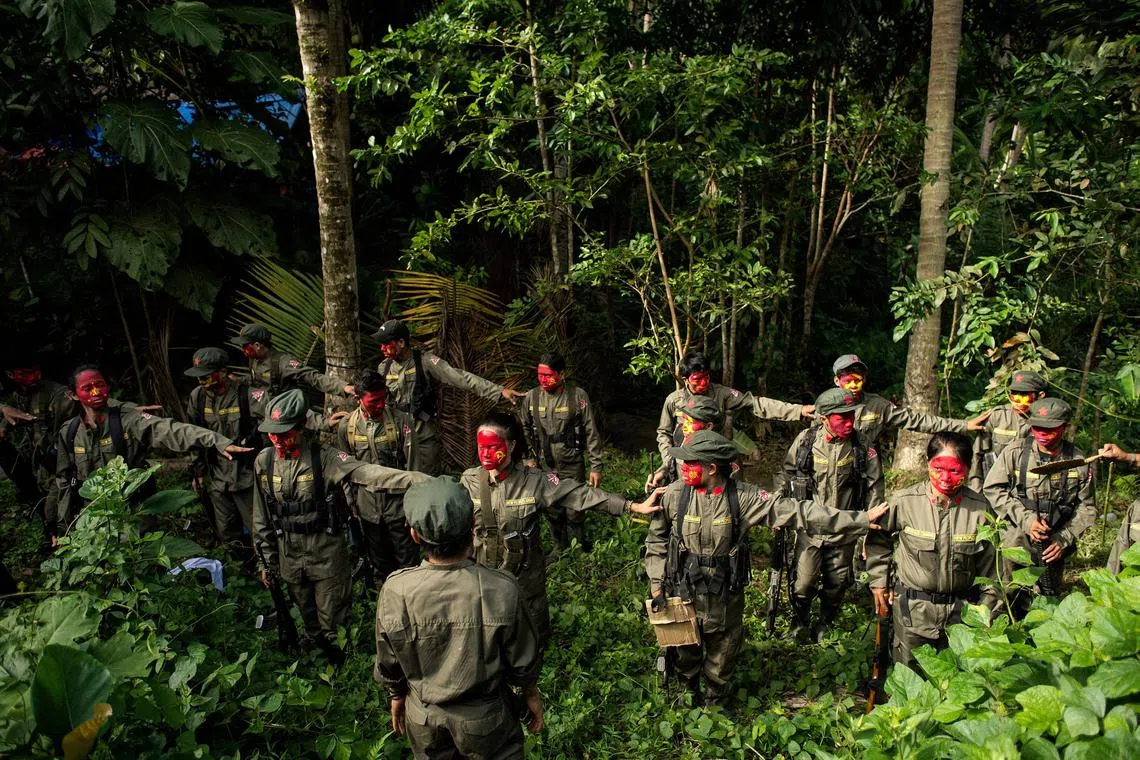Philippine govt agrees to restart peace talks with communists
Sign up now: Get insights on Asia's fast-moving developments

Members of the New People's Army are seen in formation in the Sierra Madre mountain range, east of Manila, on July 30, 2017.
PHOTO: AFP
Follow topic:
MANILA – The Philippine government and the armed group staging the longest communist insurgency in Asia have agreed to restart peace negotiations after a six-year hiatus.
Government officials and high-ranking members of the National Democratic Front of the Philippines (NDFP) agreed to a “principled and peaceful resolution to the armed conflict”, according to a joint statement dubbed the Oslo Joint Communique.
The agreement was signed by Cabinet officials and NDFP negotiators in Oslo, Norway, on Nov 23, but the document was publicised only on Nov 28 in simultaneous press conferences held by both sides.
The NDFP is the diplomatic arm of the Communist Party of the Philippines (CPP). A five-decade insurgency by the party’s armed wing, the New People’s Army (NPA), has killed more than 40,000 people, according to government estimates.
“Cognisant of the serious socio-economic and environmental issues, and the foreign security threats facing the country, the parties recognise the need to unite as a nation in order to urgently address these challenges and resolve the reasons for the armed conflict,” the statement said.
Both sides agreed to come up with a framework for peace negotiations to achieve socio-economic and political reforms “towards a just and lasting peace”.
This means that, if negotiations succeed, the communist rebels will end their armed struggle and turn into a political movement instead. No details have been shared yet as to what such a political movement would entail.
In the meantime, however, presidential peace adviser Carlito Galvez Jr said the signing of the communique will have no immediate effect as these are only “preliminary talks”. He said the military’s operations against what remains of the communist guerilla fronts in the Philippine countryside will continue for now.
The signing of the Oslo Joint Communique came on the same day that the government granted amnesty to former members of four armed groups – the CPP-NPA-NDFP, Revolutionary Proletarian Army, Moro National Liberation Front and Moro Islamic Liberation Front (Milf).
The last time the Philippine government was able to forge a peace deal with rebel groups was in 2014, when Milf commanders agreed to decommission its weapons and abandon its secession plans.
As part of the agreement, Milf now rules over the Bangsamoro region, a group of islands in the Muslim-majority southern Philippines that was granted autonomy in 2019.
The NDFP move would be something of a full circle for President Ferdinand Marcos Jr should his government succeed in ending the communist insurgency, which started in 1968, when his late father and namesake was president.
When the elder Mr Marcos put the country under martial law in 1972, he claimed that it was a response to the communist threat posed at the time by the CPP.
At the height of the CPP-NPA-NDFP’s power in 1987 – a year after Filipinos overthrew the Marcos dictatorship through a peaceful street revolution – the group had as many as 25,000 fighters, according to the Philippine military.
That number has dwindled to about 1,800 this year, said Philippine military spokesman Medel Aguilar, though the CPP estimates that the number is much higher at around 5,000.
The Philippine government over the years has repeatedly tried but failed to forge a peace deal with the communists.
Formal talks were last conducted in 2017 under then President Rodrigo Duterte who on Nov 23 that year terminated the peace talks, saying the CPP-NPA-NDFP failed to show “sincerity and commitment” in dealing with the government.
Mr Marcos moved to revive the peace talks when he succeeded Mr Duterte in 2022, sending government officials to meet the NDFP in Norway to start informal discussions.


